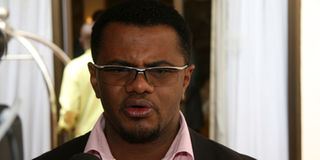CID summons Omar over fake witness claims

Omar Hassan during a Justice Affairs seminar on August 12, 2010. Suspended Higher Education minister William Ruto went public with claims that KNCHR had coached witnesses to implicate him. Photo/FILE
The Criminal Investigations Department has summoned human rights crusader Hassan Omar over a complaint that he coached witnesses to implicate suspects over the post-election violence.
The summons, issued by CID Director Ndegwa Muhoro, has created a standoff between his department and the Kenya National Commission on Human Rights where Mr Omar is a member.
To interrogate
The Sunday Nation has learnt that the CID dispatched an officer last week to interrogate Mr Hassan but he was not in his office at the time.
The same officer returned on Tuesday this week but was told the CID had to first make a request in writing.
The new twist follows a public spat between the commission and suspended Higher Education minister William Ruto who went public with claims that KNCHR had coached witnesses to implicate him. The Eldoret North MP has singled out Mr Hassan for blame.
Following the standoff, Mr Muhoro wrote to the commission, asking that Mr Hassan report to CID headquarters either Monday or Tuesday, sources privy to the exchange have told the Sunday Nation.
“In his complaint, the MP mentioned one of your commissioners, namely Hassan Omar, as having participated in the falsification of evidence,” Mr Muhoro wrote to the government commission.
On receipt of the summons from CID headquarters, the commission wrote back in a November 26 letter signed by Mr Mohammed Hallo taking “great exception to attempts to intimidate the commission in the pursuance of its functions and mandate and discredit the integrity of the commission, its officers and work”.
The commission is of the view that the police cannot impartially conduct any case that touches on post-election violence since some of their own were implicated in a KNCHR report.
The report was harshly critical of the role the police played during the post-election violence and helped in documenting information that led to the finding by the Waki team that 405 deaths were caused by the police.
“The KNCHR report further lists top security elite, both past and present, as alleged perpetrators,” said the letter.
“Being among the alleged suspects of the violence, the police are unlikely to be fair and unbiased investigators in this matter.”
The commission is relying on Section 33 of the Kenya National Commission on Human Rights Act 2002 that shields commissioners and other people working at the direction of the commission from legal proceedings related to their work.
Interfere with investigations
The commission’s letters escalated the matter to the minister for Justice Mutula Kilonzo, Prime Minister Raila Odinga and President Kibaki.
In a letter dispatched on Saturday, Mr Kilonzo appeared to lend his weight to the commission.
“Be assured of the government’s commitment to the protection of the integrity and independence (of the commission) and will not tolerate any intimidation, harassment, ridicule or otherwise of this commission,” Mr Kilonzo said in a letter copied to the Attorney-General, the Kenya Anti-Corruption Commission and the CID Director.
KNCHR also complains that the two – Mr Kipkemboi Rono and Mr Ken Wekesa – who confessed they lied in their witness statements, have not been arrested and charged.
However, ICC’s Luis Moreno-Ocampo has said the two witnesses did not give evidence before the Office of the Prosecutor, adding: “They were not going to be presented as witnesses by the office before the judges”.
“Before interviewing a witness, the office conducts rigorous tests on the credibility of the witness,” the prosecutor said in a statement.
Mr Rono and Mr Wekesa have already recorded statements with the CID. They stand accused of giving false evidence to the KNCHR and the Waki commission in January 2008, implicating the Eldoret North MP.
The two said they were promised huge amounts of money and asylum in a country of their choice. The flats they were living in were paid for by KNCHR, in addition to a monthly stipend of Sh60,000.
Their lawyer, Charles Koech, said the two had no case to answer as “they did not swear any affidavit”.
He claimed that they only gave oral evidence. “My clients gave their honest opinion and the police were even pleased with their honesty,” he told journalists outside the CID offices.




